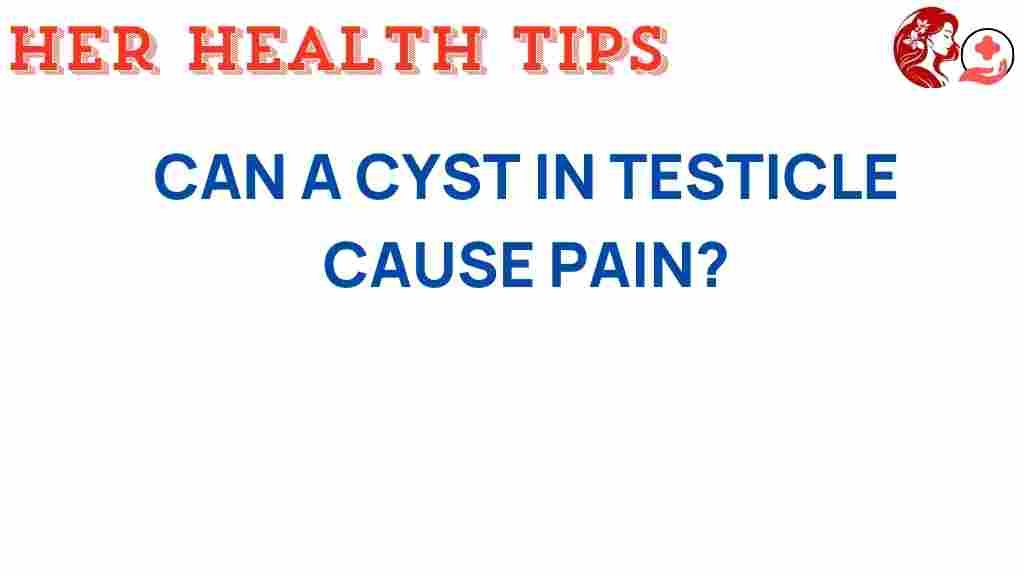Unraveling the Mystery: Can a Cyst in the Testicle Cause Pain?
Testicular health is a crucial aspect of male reproductive health, yet it often remains shrouded in mystery for many. One common concern that arises during discussions about male health is the presence of a testicle cyst. While many men may experience this condition, not everyone understands its implications, particularly regarding testicular pain. In this article, we will explore the relationship between testicle cysts and pain, delve into cyst symptoms, discuss diagnosis and treatment options, and provide valuable insights into urology and reproductive health.
Understanding Testicle Cysts
A testicle cyst is a fluid-filled sac that can develop within or on the surface of the testicle. These cysts can vary in size and may or may not cause any noticeable symptoms. Here are some key points about testicle cysts:
- They are generally benign and not cancerous.
- Common types include epididymal cysts and spermatoceles.
- They often do not require treatment unless they cause discomfort or pain.
Common Symptoms of Testicular Cysts
While many cyst symptoms may go unnoticed, some men may experience the following:
- A noticeable lump or swelling in the testicle.
- Discomfort or a feeling of heaviness.
- Occasional pain in the affected area.
- Changes in the appearance of the testicle.
It’s essential to understand that not all testicle cysts result in testicular pain. Many men live with these cysts without any significant discomfort.
Do Testicle Cysts Cause Pain?
One of the most frequently asked questions regarding testicle cysts is whether they can cause pain. The answer varies depending on several factors:
Factors Influencing Pain
1. **Size of the Cyst**: Larger cysts are more likely to cause discomfort due to pressure on surrounding tissues.
2. **Location**: Cysts located within the testicle may cause different sensations than those on the surface.
3. **Associated Conditions**: If a cyst is accompanied by other conditions, such as inflammation or infection, it may result in increased pain.
4. **Activity Level**: Physical activity or trauma to the area can exacerbate the sensation of pain.
Diagnosis of Testicle Cysts
If you suspect you have a testicle cyst or are experiencing testicular pain, it’s crucial to consult a healthcare professional. The diagnostic process typically involves:
- Physical Examination: A urologist will conduct a thorough examination of the testicles to assess any lumps or irregularities.
- Ultrasound Imaging: This non-invasive imaging technique helps visualize the cyst, determining its size and location.
- Additional Tests: In some cases, blood tests may be ordered to rule out infections or other underlying issues.
Early diagnosis is vital for ensuring optimal male health and addressing any potential complications.
Treatment Options for Testicle Cysts
Most testicle cysts do not require treatment unless they cause significant discomfort or complications. Here are some common treatment options:
1. Observation
If the cyst is small and asymptomatic, your urologist may recommend a watchful waiting approach, monitoring the cyst for any changes.
2. Surgical Removal
If the cyst is large or painful, surgical intervention may be necessary. This can involve:
- Excision: Removing the cyst entirely while preserving healthy tissue.
- Drainage: In some cases, the cyst may be drained to alleviate pressure.
3. Medication
If inflammation or infection accompanies the cyst, antibiotics or anti-inflammatory medications may be prescribed.
Managing Testicular Pain
If you are experiencing testicular pain, here are some troubleshooting tips to manage your discomfort:
- Rest: Avoid strenuous activities or heavy lifting that may aggravate the pain.
- Ice Therapy: Applying an ice pack wrapped in a cloth can help reduce swelling and discomfort.
- Pain Relievers: Over-the-counter pain medications, such as ibuprofen or acetaminophen, may provide relief.
- Supportive Underwear: Wearing supportive undergarments can alleviate discomfort and provide support.
Always consult with a healthcare provider before starting any treatment or self-care regimen.
When to Seek Medical Attention
While testicle cysts are often benign, there are instances when immediate medical attention is necessary. Seek help if you experience:
- Severe or persistent testicular pain.
- Swelling or redness in the groin area.
- Fever or chills, which may indicate an infection.
- Blood in the urine or semen.
These symptoms could indicate a more serious condition that requires urgent evaluation.
Preventive Measures for Testicular Health
- Regular Self-Examinations: Monthly self-exams can help you detect any changes in your testicles early.
- Healthy Lifestyle: A balanced diet, regular exercise, and hydration contribute to overall reproductive health.
- Safe Sexual Practices: Using protection can help prevent sexually transmitted infections that may affect testicular health.
- Regular Check-Ups: Routine visits to a urologist can help monitor your reproductive health and address any concerns.
Conclusion
In conclusion, while a testicle cyst may be a source of concern for many men, understanding its nature and potential impact on testicular pain is essential. Most cysts are benign and do not require treatment unless they cause significant discomfort or complications. If you experience symptoms related to testicle cysts, seeking medical evaluation is crucial for proper diagnosis and treatment.
Remember that maintaining good testicular health involves a proactive approach, including regular self-examinations and consultations with healthcare professionals. For more information on reproductive health and urological concerns, consider exploring resources like Men’s Health Network.
Your health matters, so don’t hesitate to seek help and stay informed about your body!
This article is in the category Reproductive and created by HerHealthTips Team
